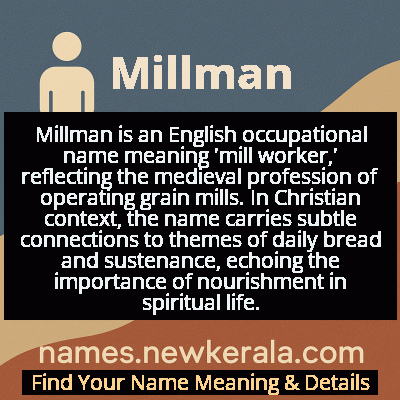Millman Name Meaning & Details
Origin, Popularity, Numerology Analysis & Name Meaning of Millman
Discover the origin, meaning, and cultural significance of the name MILLMAN. Delve into its historical roots and explore the lasting impact it has had on communities and traditions.
Name
Millman
Gender
Male
Origin
Christian
Lucky Number
2
Meaning of the Name - Millman
Millman is an English occupational name meaning 'mill worker,' reflecting the medieval profession of operating grain mills. In Christian context, the name carries subtle connections to themes of daily bread and sustenance, echoing the importance of nourishment in spiritual life.
Millman - Complete Numerology Analysis
Your Numerology Number
Based on Pythagorean Numerology System
Ruling Planet
Moon
Positive Nature
Diplomatic, friendly, artistic, empathetic.
Negative Traits
Over-sensitive, moody, indecisive, prone to self-pity.
Lucky Colours
Green, cream, white.
Lucky Days
Monday.
Lucky Stones
Pearl, moonstone.
Harmony Numbers
1, 3, 4.
Best Suited Professions
Diplomats, mediators, caregivers, artists.
What People Like About You
Cooperative spirit, friendliness, artistic talent.
Famous People Named Millman
John Millman
Professional Tennis Player
Defeated Roger Federer at 2018 US Open, achieved World No. 33 ranking
Robert Millman
Psychiatrist and Professor
Renowned work in addiction psychiatry and psychopharmacology at Weill Cornell
Michael Millman
Civil Rights Attorney
Represented death row inmates and worked on significant civil rights cases
David Millman
Computer Scientist
Contributions to computational geometry and geometric modeling
Name Variations & International Equivalents
Click on blue names to explore their detailed meanings. Gray names with will be available soon.
Cultural & Historical Significance
Extended Personality Analysis
Those bearing the Millman name are typically characterized by strong work ethic, reliability, and practical intelligence. Their approach to life mirrors the steady, methodical operation of a mill—consistent, thorough, and focused on producing quality results. Millmans tend to be patient problem-solvers who excel at breaking down complex challenges into manageable components. They value community and cooperation, often serving as stabilizing forces in groups and organizations. While they may appear reserved initially, they possess deep loyalty to those they trust and strong protective instincts toward their communities. Their practical nature makes them excellent in hands-on professions and technical fields, where their systematic approach and attention to detail shine. Millmans typically prefer substance over flash, valuing genuine accomplishment over superficial recognition. They combine traditional values with adaptive intelligence, making them both respectful of established methods and open to innovation when it serves practical purposes. This balance of stability and capability makes Millmans respected figures in both professional and personal spheres.
Modern Usage & Popularity
In contemporary naming practices, Millman remains predominantly a surname, though it has gained some traction as a distinctive given name, particularly in English-speaking countries. Its usage reflects a modern trend toward occupational surnames as first names, appealing to parents seeking names with historical depth and clear meaning. The name maintains moderate but stable frequency, avoiding both extreme popularity and complete obscurity. It's particularly favored in regions with strong English heritage and among families with connections to engineering, manufacturing, or skilled trades. As a given name, Millman projects an image of reliability, craftsmanship, and traditional values while still feeling fresh and distinctive. Its occupational origins give it an authentic quality that resonates in an era valuing authenticity and heritage. The name's steady usage pattern suggests it will remain a solid, if uncommon, choice for families seeking a name with substance and historical resonance without being overly trendy or fashionable.
Symbolic & Spiritual Meanings
Symbolically, Millman represents the transformative power of patient, consistent work and the alchemy of turning raw potential into practical value. The name embodies the concept of refinement—the process of grinding away imperfections to reveal essential usefulness. It symbolizes the bridge between natural resources and human civilization, representing humanity's ability to harness and transform the natural world for communal benefit. The cyclical nature of milling work makes Millman emblematic of persistence, routine, and the understanding that meaningful achievements often require sustained effort over time. In spiritual terms, the name suggests the grinding away of ego and the refinement of character through life's challenges. It also represents community interdependence, as the historic mill served entire villages and required cooperation between farmers, millers, and bakers. Ultimately, Millman symbolizes the dignity of essential work and the understanding that society's foundation rests on the reliable performance of crucial, if sometimes overlooked, roles.

